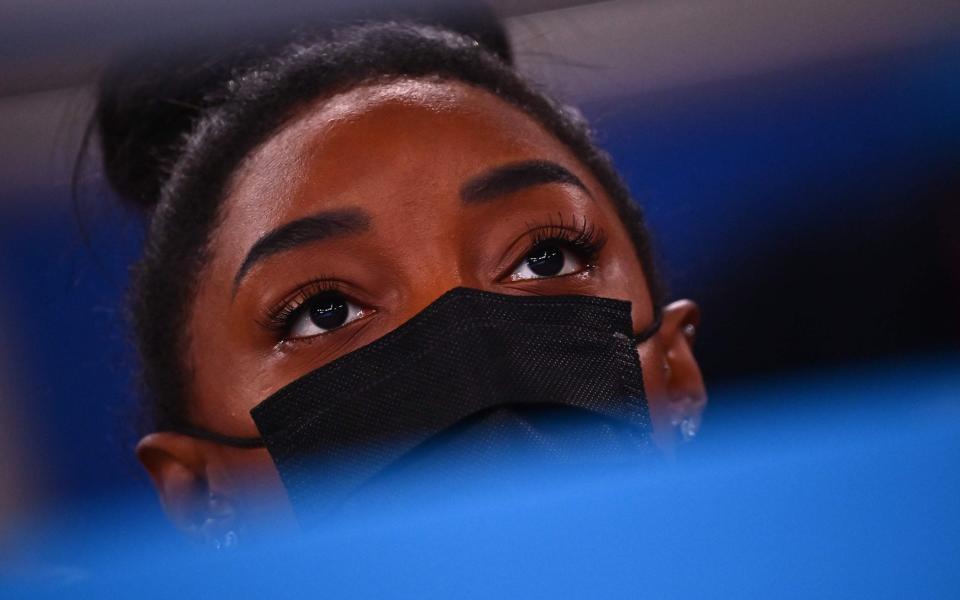Tesco staff get better mental health support than Olympic athletes, claims former British gold medallist

Tesco supermarket staff get better mental health support than Olympic athletes, a former British gold medallist said, after Simone Biles withdrew from more events over her “freak out”.
Biles, the 24-year-old four-time 2016 champion, will now miss Sunday’s vault and uneven bars finals. She had already quit both the team and all-around finals, having sent shockwaves across sport by admitting her “mind and body are not in sync” due to mental health issues.
On Saturday, former cyclist Callum Skinner, who now works with the Global Athlete campaign group, launched a vehement attack on the safeguards that are in place at elite levels. Skinner, a 2016 sprint team track gold medallist who took a delivery driving job for Tesco during the pandemic, told BBC Radio 5 Live: “I’ve got the perspective of seeing both sides. I’ve had a number of employers and even spent a few months during Covid doing an entry level position with a British supermarket.
“I can quite confidently say that their detections, their interest in your wellbeing is far greater than I certainly experienced in the British Cycling system. I think sport has an obligation to lead the way. People look at us and think how can you be so successful? How do you perform under pressure? There’s no reason why we can’t lead the way when it comes to health and wellbeing too.”
After further consultation with medical staff, Simone Biles has decided to withdraw from the event finals for vault and the uneven bars. She will continue to be evaluated daily to determine whether to compete in the finals for floor exercise and balance beam. pic.twitter.com/kWqgZJK4LJ
— USA Gymnastics (@USAGym) July 31, 2021
He was speaking as a statement from USA Gymnastics said that, after further consultation with medical staff, the decision had been taken to withdraw Biles from both the vault and the uneven bars.
Her participation in the two remaining events, the floor and the balance beam respectively, on Monday and Tuesday, must also be in serious doubt, but the door has been left open.
“She will continue to be evaluated daily to determine whether to compete in the finals for floor exercise and balance beam,” said the statement.
Biles, who is one of the greatest gymnasts in history and was expected to be the global star of these Olympics, has been open about her mental health difficulties while in Tokyo and continued to support her US team-mates from the sidelines.
Skinner, meanwhile, hit back at recent criticism from those who claim she was wrong to blame her poor early performances in the Games on her feelings. “The question to them is what would they prefer,” he added. “Would they prefer athletes to lie? To suppress something they’re maybe going through?
“Part of what makes sport fantastic is that you can follow people on their journey and that means warts and all. We’re pretty happy to follow people when it’s a muscle tear or a fracture. I can’t really understand why people find it so difficult to follow along when it’s a mental health issue. It’s just semantics. She could have said it’s something else and there wouldn’t have been this uproar.”
During a social media Q&A on Friday, Biles expanded further on the challenge that she was facing. The gymnast said she had experienced the “twisties” before – a kind of mental block that has been compared to the yips in golf, but never on all four pieces of apparatus.
“It’s never transferred to bars and beam before for me,” she said. “It strictly likes vault and floor – the hardest two. But this time it’s literally on every event. Which sucks. Really bad.”
The fear in gymnastics is that an attack of the “twisties” could cause a person to dangerously lose their sense of space and dimension as they are in the air, resulting in a loss of control of their body which can cause extra twists or flips and unexpected landings. It can happen to even the most experienced gymnasts on the most familiar of routines.
“It’s honestly petrifying trying to do a skill but not having your mind and body in sync,” said Biles. “I don't think you realise how dangerous this is on a competition hard surface. Literally cannot tell up from down... I also have no idea where I am going to land. Or what I am going to land on.”
Describing his own struggles with mental health, Skinner, meanwhile, said during the BBC interview that he sought the help of renowned psychiatrist Dr Steve Peters, who has worked with an array of British sporting stars. “I went to him and I wanted him to say ‘everything’s fine just get on with it’, because he’d been tough with me in the past,” he added. “Instead he put an arm around my shoulder and said you’re really unwell and you need some support and TLC.
“That was the breakthrough moment for me and I finally took it seriously. Together we decided I should ask for a break from cycling to get my head straight. I was going through mental illness, I wasn’t mentally weak.” He says he was then “completely crushed” when told he would not be allowed to take a break.

 Yahoo Sport
Yahoo Sport 





































